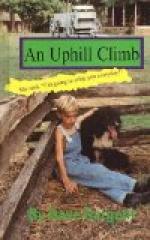It was like him to forget all about the herder and the promise of pinochle that night. He went eagerly to the decrepit little shed which housed Rambler, his long-legged, flea-bitten gray; saddled him purposefully and rode away toward the violet hills at the trail-trot which eats up the miles with the least effort.
That night, although he slept in a hamlet which called itself a town, his purpose kept firm hold of him, and he rode away at a decent hour the next morning,—and he rode sober. He kept his face toward the hills, and he did not trouble himself with any useless analysis of his unusual temperateness. He was going to blow in to the Double Cross some time before he slept that night, and have a talk with Ches. He had a pint of fairly good whisky in his pocket, in case he felt the need of a little on the way, and beyond those two satisfactory certainties he did not attempt to reason. They were significant, in a way, to a man with a tendency toward introspection; but Ford was interested in actualities and never stopped to wonder why he bought a pint, rather than a quart, or why, with Ches Mason in his mind, he declined to “set in” to the poker game which was running to tempting jackpots, the night before; or why he took one glass of wine before he mounted Rambler and let it go at that. He never once dreamed that the memory of cheerful, steady-going Ches influenced him toward starting on his friendly pilgrimage the Ford Campbell whom Mason had known eight years before; a very different Ford Campbell, be it said, from the one who had caused a whole town to breathe freer for his absence.
Of his wife Ford had thought less often and less uncomfortably since he left the town wherein had occurred the untoward incident of his marriage. He was not unaccustomed to doing foolish things when he was drunk, and as a rule he made it a point to ignore them afterwards. His mysterious, matrimonial accident was beginning to seem less of a real catastrophe than before, and the anticipation of meeting Ches Mason was rapidly taking precedence of all else in his mind.
So, with almost his normal degree of careless equanimity, he faced again the rim of hills—nearer they were now, with a deeper tinge that was almost purple where the shadows lined them here and there. Somewhere out that way lay the Double Cross ranch. Forty miles, one man told him it was; another, forty-three. At best it was far enough for the shortened daylight of one fall day to cover the journey. Ford threw away the stub of his after-breakfast cigarette and swung into the trail at a lope.




